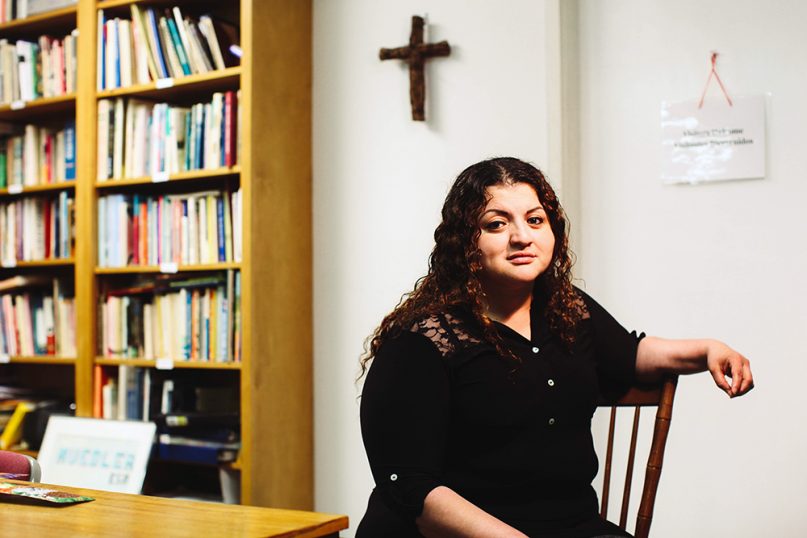(RNS) — About a dozen people taking refuge in sanctuary churches across the country received a letter from Immigration and Customs Enforcement earlier this week, informing them they owe hundreds of thousands of dollars in civil penalties for disobeying orders to leave the country.
Among those was Rosa del Carmen Ortez Cruz, a 38-year-old mother of four living at a Presbyterian church in Chapel Hill, N.C., who was told she owes more than $300,000 for overstaying her deportation order. Her lawyers at McKinney Immigration Law in Greensboro, N.C., received a similar letter.
Ortez Cruz fled Honduras for the United States in 2002, after her domestic partner, the father of her son, stabbed her multiple times. The Church of Reconciliation and the Chapel Hill Mennonite Fellowship offered her refuge from immediate deportation last year because she is afraid of returning to Honduras, where her ex-partner lives.
“This goes along with the extremely cruel and unusual tactics to create fear,” said Noel Andersen, grassroots coordinator with Church World Service, which helps organize the sanctuary movement. “Clearly it’s an attack on the sanctuary movement.
And he added, “It creates fear among other people trying to claim sanctuary.”
Nationwide, there are 44 undocumented immigrants who have publicly announced they are taking refuge in U.S. religious congregations, Andersen said. It’s unclear why fewer than one-third were targeted with fines.
Among those targeted was Edith Espinal, a Mexican national who took sanctuary in a Columbus, Ohio, Mennonite Church and received a fine of $497,777. Others receiving fine letters were immigrants living in churches in Colorado, Utah, Texas, Virginia and Washington state, Andersen said.
An ICE spokesman would not say how many so-called Notice of Intention to Fine letters were mailed, but he said the practice began in December and is authorized by the half-century-old Immigration and Nationality Act.
“The decision to issue a NIF is determined on a case-by-case basis, taking into account steps the alien has taken to faithfully meet the obligation of their removal order or voluntary departure,” said Matthew Bourke, the ICE spokesman.
Bourke said statutes set two classes of fines. Those who have “failed to meet the obligations of their removal” are fined at no more than $500 per day; in Ortez Cruz’s case, the inflation-adjusted amount totals $799 a day. Immigrants who have failed to voluntarily depart are fined $3,000, according to the statute, he said.
Those receiving the fines were given 30 days to respond.

Rosa Ortez Cruz has been in santuary at the Church of Reconciliation in Chapel Hill, N.C., since April 2018. Photo by Stef Bernal Martinez
Ortez Cruz’s attorney, Jeremy McKinney, of Greensboro, said his firm would challenge the fine.
“I have been practicing immigration law since 1997 and I’ve never seen this,” he said. “It seems unprecedented. Right off the bat it seems there was a lack of notice that this fine could be assessed. At no point did ICE or the immigration judge provide any kind of notice that this could be a consequence for failure to depart.”
The fines come amid mounting concern about the Trump administration’s hard-line immigration policies. On Monday (July 1), President Trump told reporters that massive deportation sweeps were imminent after the Independence Day holiday.
On Tuesday, an explosive new report from the Homeland Security Department’s inspector general said border detention centers along the southern border were overcrowded and squalid — conditions it likened to “a ticking time bomb.”
But sanctuary advocates alleged that the fines were more directly aimed at curbing the sanctuary movement, a longtime Trump administration goal. Churches — along with schools and hospitals — are considered “sensitive locations” where federal immigration enforcement officers are unlikely to arrest, search or interview people under most circumstances.
At least one pastor wondered whether the imposition of fines was the first sign of a coming change in policy.
“I am a bit concerned that ICE might be setting the stage to rescind sensitive-location policies,” said the Rev. Randall Keeney, vicar at St. Barnabas Episcopal Church in Greensboro.
But the principal effect of the fines may be to scare religious congregations into not sheltering immigrants — especially if they fear the government might fine them for doing so.
Most of those immigrants in sanctuary have few, if any, financial means and are unable to work beyond the few chores they can perform for their hosts.
Isaac Villegas, pastor of Chapel Hill Mennonite Fellowship, said his church wouldn’t take the bait.
“We understood from the beginning that the federal government does not approve of us taking care of our people,” Villegas said. “We’re on different sides of history on that matter. We know they’ll do whatever they can to intimidate us.”
Ortez Cruz’s lawyer said he was puzzled by the fine since his client’s case is already pending in the 4th U.S. Circuit Court of Appeals. A decision is expected late this year or early next.
Ortez Cruz was charged with two misdemeanors stemming from an altercation with her then-teenage son. That led to deportation proceedings beginning in 2013.
Andersen of Church World Service said he expected the fines would be challenged because they appear to selectively target undocumented immigrants in sanctuary churches.
“What would it mean for ICE to enforce this statute just on the sanctuary movement?” he said. “It’s pretty clear that this is an attack on our faith.”





